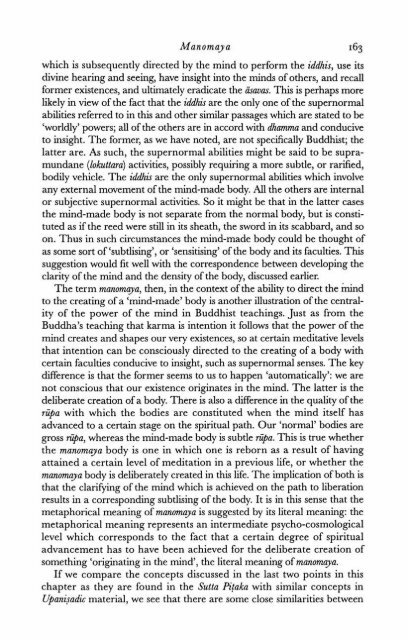Identity and Experience_Hamilton_1996
Identity and Experience_Hamilton_1996
Identity and Experience_Hamilton_1996
Create successful ePaper yourself
Turn your PDF publications into a flip-book with our unique Google optimized e-Paper software.
Manomaya 163<br />
which is subsequently directed by the mind to perform the iddis, use its<br />
divine hearing <strong>and</strong> seeing, have insight into the minds of others, <strong>and</strong> recall<br />
former existences, <strong>and</strong> ultimately eradicate the cfsavas. This is perhaps more<br />
likely in view of the fact that the iddhis are the only one of the supernormal<br />
abilities referred to in this <strong>and</strong> other similar passages which are stated to be<br />
'worldly' powers; all of the others are in accord with dhamma <strong>and</strong> conducive<br />
to insight. The former, as we have noted, are not specifically Buddhist; the<br />
latter are. As such, the supernormal abilities might be said to be supramundane<br />
(lokuttara) activities, possibly requiring a more subtle, or rarified,<br />
bodily vehicle. The iddhis are the only supernormal abilities which involve<br />
any external movement of the mind-made body. All the others are internal<br />
or subjective supernormal activities. So it might be that in the latter cases<br />
the mind-made body is not separate from the normal body, but is constituted<br />
as if the reed were still in its sheath, the sword in its scabbard, <strong>and</strong> so<br />
on. Thus in such circumstances the mind-made body could be thought of<br />
as some sort of 'subtlising', or 'sensitising' of the body <strong>and</strong> its faculties. This<br />
suggestion would fit well with the correspondence between developing the<br />
clarity of the mind <strong>and</strong> the density of the body, discussed earlier.<br />
The term manomya, then, in the context of the ability to direct the kind<br />
to the creating of a 'mind-made' body is another illustration of the centrality<br />
of the power of the mind in Buddhist teachings. Just as from the<br />
Buddha's teaching that karma is intention it follows that the power of the<br />
mind creates <strong>and</strong> shapes our very existences, so at certain meditative levels<br />
that intention can be consciously directed to the creating of a body with<br />
certain faculties conducive to insight, such as supernormal senses. The key<br />
difference is that the former seems to us to happen 'automatically': we are<br />
not conscious that our existence originates in the mind. The latter is the<br />
deliberate creation of a body. There is also a difference in the quality of the<br />
rzipa with which the bodies are constituted when the mind itself has<br />
advanced to a certain stage on the spiritual path. Our 'normal' bodies are<br />
gross rzipa, whereas the mind-made body is subtle riipa. This is true whether<br />
the manomaya body is one in which one is reborn as a result of having<br />
attained a certain level of meditation in a previous life, or whether the<br />
manomaya body is deliberately created in this life. The implication of both is<br />
that the clarifying of the mind which is achieved on the path to liberation<br />
results in a corresponding subtlising of the body. It is in this sense that the<br />
metaphorical meaning of manomaya is suggested by its literal meaning: the<br />
metaphorical meaning represents an intermediate psycho-cosmological<br />
level which corresponds to the fact that a certain degree of spiritual<br />
advancement has to have been achieved for the deliberate creation of<br />
something 'originating in the mind', the literal meaning of manomaya.<br />
If we compare the concepts discussed in the last two points in this<br />
chapter as they are found in the Sutta Pitaka with similar concepts in<br />
Upani;adic material, we see that there are some close similarities between


